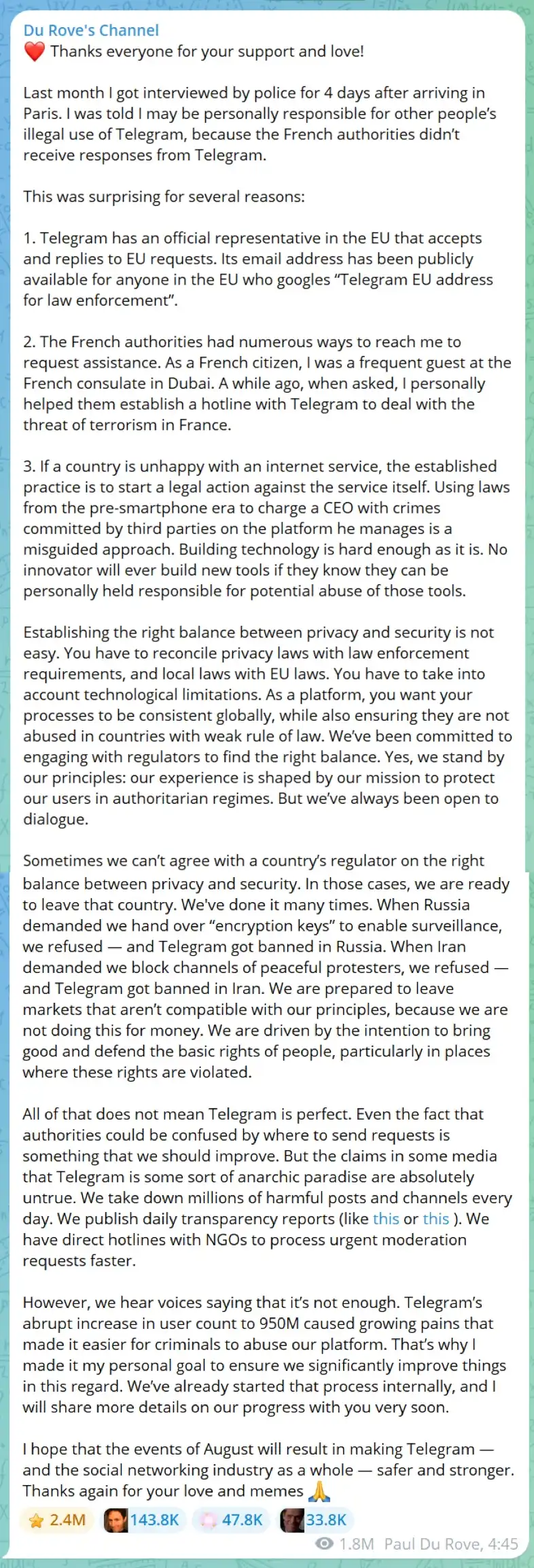El fundador de TG habla por primera vez después de ser arrestado: No estamos aquí para ganar dinero, sino para defender los derechos de las personas
On August 25, Telegram founder and CEO Pavel Durov was detained in Paris, France, and faced multiple charges including fraud, money laundering, and terrorism. On August 29, Pavel Durov was released after paying a 5 million euro bail, but was not allowed to leave France. A complete summary of the incident: Real-time update | South Korea investigates Telegram; encryption-related businesses account for about 40% of Telegrams total revenue
After nearly a week of silence, Durov responded to the Paris detention incident on his official personal channel for the first time this morning. Here is his full statement:
Thank you for your support and concern!
Last month, I was questioned by police for four days after arriving in Paris. I was told that I could be held personally responsible for the illegal use of Telegram by others because the French authorities had received no response from Telegram.
This surprised me for the following reasons:
1. Telegram has an official representative in the EU who is responsible for receiving and responding to EU requests. Its email address is public and anyone in the EU can find it by simply searching Telegram EU law enforcement contact address on Google.
2. French authorities have multiple ways to contact me to request assistance. As a French citizen, I am a frequent visitor to the French Consulate in Dubai. Previously, when they requested it, I personally helped them set up a hotline with Telegram to deal with terrorist threats in France.
3. If a country is unhappy with an internet service, the usual approach is to bring legal action against the service itself. Using laws from before the smartphone era to hold platform CEOs accountable for crimes committed by third parties on their platforms is a misguided approach. Building technology is already hard. Innovators would never build new tools if they knew they could be held personally liable for potential misuse of those tools.
Finding the right balance between privacy and security is not easy. You have to reconcile privacy laws with law enforcement requirements, and local laws with EU laws. You also need to consider technical limitations. As a platform, you want your processes to be consistent globally, while ensuring that they cannot be abused in countries with weak laws. We are always committed to working with regulators to find the right balance. Yes, we stand by our principles: our experience is shaped by our mission to keep users safe in repressive regimes. But we are also always willing to have a dialogue.
Sometimes we can’t find the right balance between privacy and security with a country’s regulators. In these cases, we’re ready to leave the country. In fact, we’ve already done so. When Russia asked us to hand over our “encryption keys” for surveillance, we refused — and Telegram was banned in Russia. When Iran asked us to block channels of peaceful protesters, we refused — and Telegram was banned in Iran. We’re ready to leave markets that are incompatible with our principles, because we’re not in this to make money. We’re in this to bring goodwill and defend people’s fundamental rights, especially where those rights are violated.
That doesn’t mean Telegram is perfect. Authorities are confused about the channels through which requests are sent, and that’s something we need to improve. But the claims by some media that Telegram is some kind of anarchist paradise are simply untrue. We remove millions of harmful posts and channels every day. We publish daily transparency reports (such as this one o this one ). We also have direct hotlines with NGOs to process urgent moderation requests faster.
However, we’ve noticed some voices that think this isn’t enough. The sudden increase in Telegram users to 950 million has brought with it growing pains, making it easier for criminals to abuse our platform. That’s why I’m making sure we continue to make improvements on this front. We’ve already started this process internally and will share more details on our progress with you soon.
I hope that the events of August will make Telegram, and the entire social network industry, safer and stronger. Thank you again for your concern and support.
Image source: Durov TG Channel
This article is sourced from the internet: TG founder speaks out for the first time after being arrested: We are not here to make money, but to defend people’s basic rights
Autor original: Frank, KOL de PANews @0x SunNFT reveló en Twitter que ganó 150.000 U en un minuto con el token MEME BAYC, lo que hizo suspirar a innumerables personas. Después de una investigación cuidadosa, la gente descubrió que este podría ser otro proyecto de Huang Licheng (Big Brother Maji), un veterano jugador de criptomonedas. Oportunidades de arbitraje causadas por diferencias de precios En resumen, el proyecto en el que participa @0x SunNFT es un protocolo ERC-404 que puede convertir los NFT de Bored Ape Yacht Club (BAYC) en tokens. Este proyecto se llama APE Fi. Según la presentación oficial del proyecto, se pueden intercambiar 100 millones de tokens BAYC por un NFT de BAYC. Por el contrario, los titulares también pueden intercambiar NFT por 100 millones de tokens BAYC. De hecho, el precio actual de los tokens BAYC se mantiene en torno a $0.00030, lo que…








